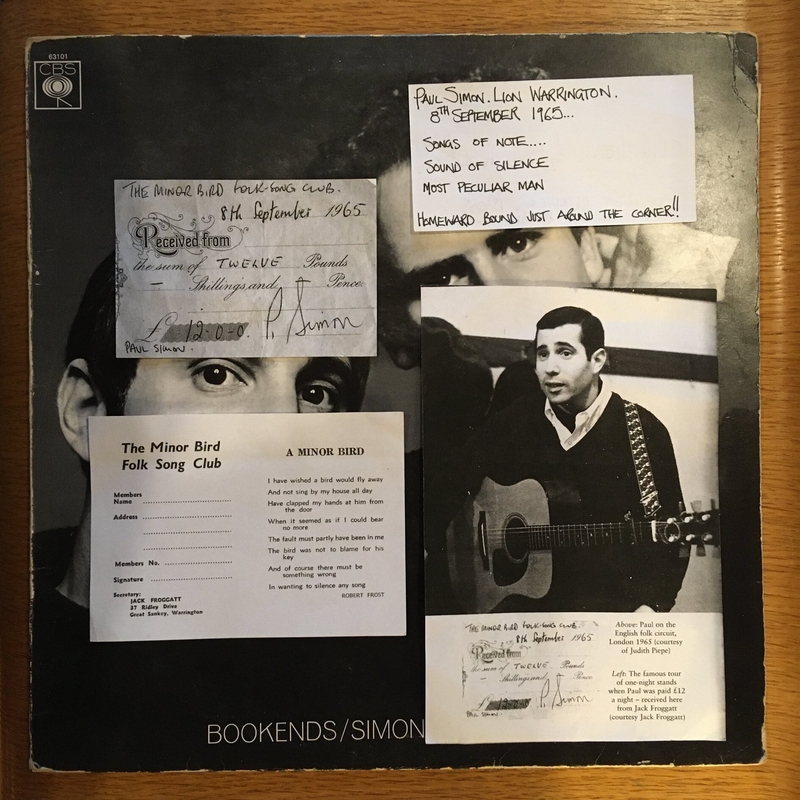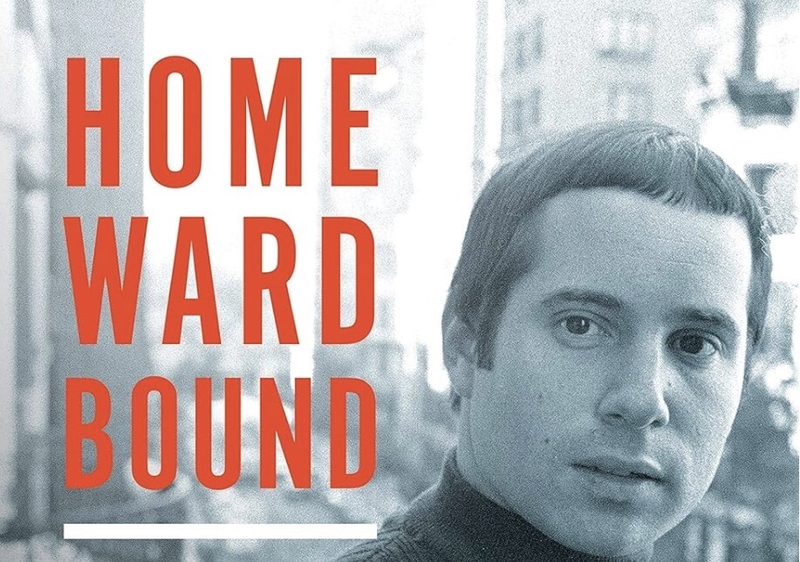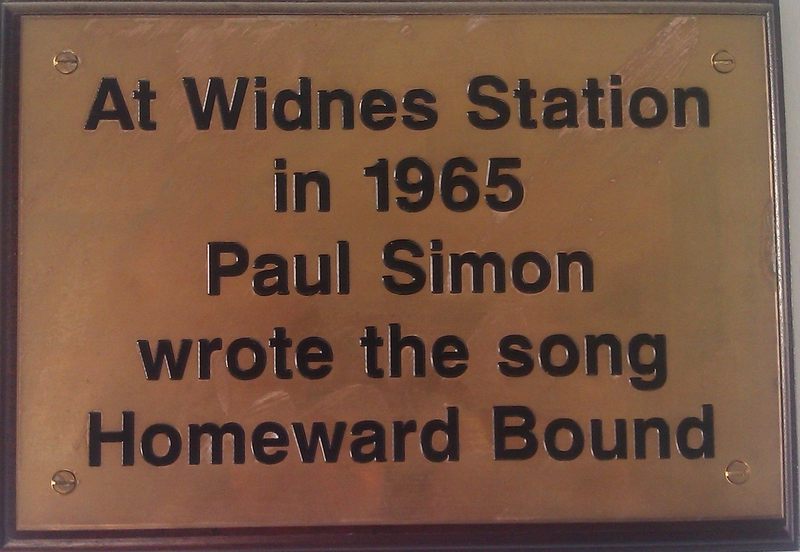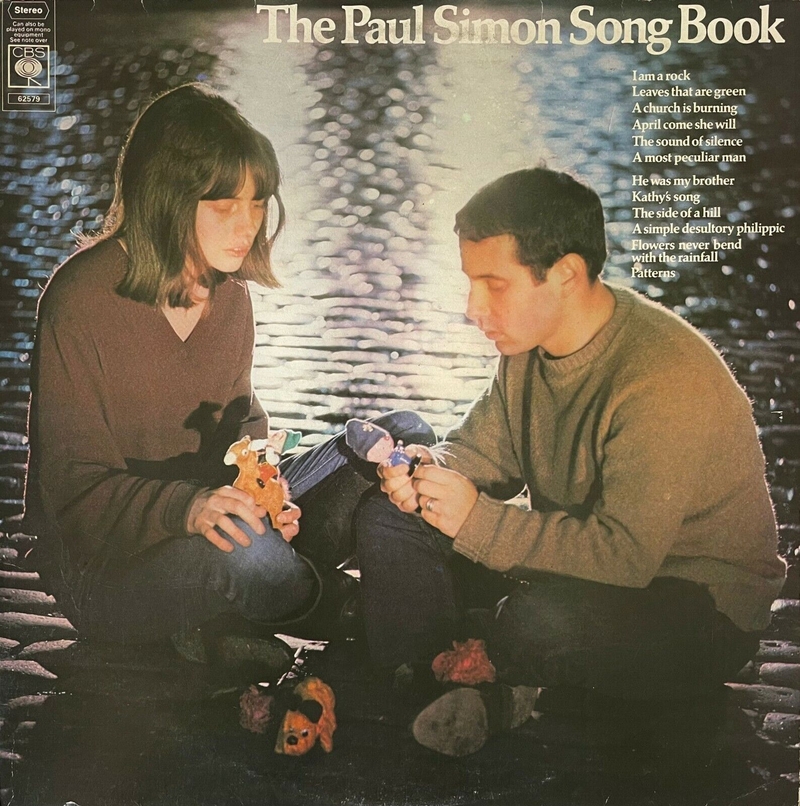Homeward Bound, Paul Simon, Widnes Station. Myth or Reality?
Andrew Rosthorn on four decades of searching the movies and the factories
Part 1: Sitting in a railway station
I first kicked this can up the road nearly forty years ago on the day I told the Sunday Mirror that the station house at Widnes in Cheshire was up for sale. The story was irresistible. "How would you like to live on the platform where Paul Simon wrote Homeward Bound?" The Liverpool papers rubbished the story next day.
No folk singer, yearning for a girl in Essex, would ever be catching a train home from Widnes. Warrington was the place for trains back to Kathy Chitty in Brentwood, Essex, or to the single room in German-born Judy Piepe's East End crash pad in Cable Street. An eastbound train from Widnes would take you no further than Manchester Central.
That station had to be Warrington Bank Quay, "or maybe Runcorn, or maybe Ditton Junction or even Crewe." The Mirror in Manchester gave me five days to sort out the mess I had caused. The news desk found cuttings from the 1970s to suggest that Paul Simon had talked to the BBC and to the Melody Maker about staying at a house in Widnes.
But our man in America said the mega folk-rock star had become reclusive and unlikely to confirm our story. A wandering New Yorker who found himself on a station platform in Widnes could be forgiven some uncertainty. "Paul stayed for five days.
I drove him to Widnes station in my Minivan." The town was turfed out of Lancashire into Cheshire, by government decree nine years after Paul Simon stayed there. There have been at least four other railway stations in Widnes and the charming Grade II listed twin-pavillion Cheshire Lines station that opened in 1873 as "Farnworth for Widnes" has changed its name four times in 150 years.
We were saved when a radio presenter came forward with a notebook showing that on September 13, 1965, he paid Paul Simon twelve pounds for a one-night stand at the Howff Folk Club in Widnes. Geoff Speed, who presented BBC Radio Merseyside's Folkscene for 47 years, saved our bacon. "Paul stayed for five days with my family in Widnes and when it was time for him to move on, I drove him to Widnes station in my Minivan. "It was definitely Widnes station.
As the song says, he wasn't going home to London, he was on a tour of one-night stands. His suitcase and guitar in hand. The next booking was in Hull and he was heading for Manchester." That settled it for the Sunday Mirror.
 Paul Simon collage:courtesy of Jack Froggatt.
Paul Simon collage:courtesy of Jack Froggatt.Image: Jack Froggatt
Part 2: Every stop is neatly planned
I doubled down in 1989 when my friend Graham Nown roped me into some research for the Rock Gazetteer of Britain, to be published by Banyan Books and sponsored by Harp Lager as the "definitive record of Britain's pop geography from 1955 to 1989". I chipped in at least three items for the gazetteer; Widnes station, the "four thousand holes in Blackburn, Lancashire" and the name of my old Oxford college, where Jeffrey Archer had tricked the Beatles into attending an Oxfam charity dinner. The blurb on the back cover of the gazetteer posed two questions: "Where was Paul Simon when he wrote Homeward Bound?" and "Where did Jeffrey Archer lure the Beatles in 1964?"
Harp Lager fixed a large stainless steel plaque on the eastbound platform at Widnes but it was soon stolen and so was the replacement. Eventually, after Paul Simon had appealed in vain for the return of the missing plaques during a concert at the Albert Hall, the students at Warrington Collegiate Institute manufactured a brass thief-proof replacement which survives on the westbound platform at Widnes station. Paul Simon and Geoff Speed were both 23 when the wandering New Yorker sang The Sound of Silence to 150 members of the Howff Folk Club, crammed into a rented room at the Grosvenor Hotel in Widnes on September 13, 1965.
A few hours earlier in New York City, Columbia Records released an "electric" version of The Sound of Silence. Unknown to Simon or Garfunkel, producer Tom Wilson had over-dubbed their 1964 acoustic guitar efforts using a team of session musicians with electric guitars, bass and drums. By January 1966 Columbia's jangly version was the number one single in America.
He got on very well with my father and they could hear him working on a song that just might have been Homeward Bound That's why Paul Simon went home to New York City. On the cover of the studio album of the Sounds of Silence, the artists were photographed in California, looking back at the camera and wearing long British college scarves acquired by Paul when he was rooming with a family in Brentwood, the Essex suburb where Kathy Chitty, 18, future muse of Kathy's Song and America, had been ticket-taker on folk nights at the Railway Hotel.
When Paul Simon appeared in Liverpool in 2002, singing Homeward Bound to a crowd of four thousand at the Summer Pops concert in the Kings Dock, Geoff Speed, remembered how "we were great friends during those five days in Widnes. Paul was a beautiful guitarist. He stunned our crowd that night at the Howff.
"He stayed with my parents and slept on a bunk bed in my brother's room. He got on very well with my father and they could hear him working on a song that just might have been Homeward Bound. When it was time for him to leave he rang me and I drove him to Widnes station because I think he had a booking at one of the studios in Manchester and he was due to appear in Hull on September 17."
Using Geoff's Spanish guitar, Paul showed him how to play Angie [or Anji] a difficult acoustic finger-picked guitar piece that Simon had just learned in London from Davy [later Davey] Graham, the self-taught guitar pioneer of the British folk revival. Geoff Speed later named his daughter Angie.
 Widnes Railway Station today Image: Peter L Vardy
Widnes Railway Station today Image: Peter L VardyPart 3 Every stranger's face I see
In 2004, the American broadcaster Scott Simon [no relation to Paul] interviewed Simon and Garfunkel together and asked Paul about Homeward Bound. His answer fitted the story we had heard in Widnes: "That is a really nice song.
It means a lot to me. I really was in a railway station in the North of England writing about a specific person and wanting to get back to her." In another interview with Michael Bonner for the London magazine Uncut, he described the one-night stands in England.
"Mostly you played in some room above a pub, where they set up some chairs. Maybe they had a microphone with speakers, or maybe they didn't. Then you sang without it.
Or there were clubs. There was a club in Soho they called Les Cousins. That was my home club.
I played there more than other places. When I went up north, I played in Widnes and Warrington. It was around there, one of those railway stations, that Homeward Bound is about.
You slept on a couch. Whoever ran the club let you sleep on their couch. You saved money.
I used to get paid around that time maybe GBP15 a night, which was considered pretty good. Then right before Simon & Garfunkel hit, I got up to GBP20, GBP25 a night." Paul Simon: a Life by Marc Eliot, published in New York in 2010, included a romantic version of the accepted story: "After playing a club near Liverpool, standing on the station at Widnes, waiting for the early morning milk train back to London one night, Paul began to compose, first in his head and then on a scrap of paper, Homeward Bound, a song filled with images of self-loathing, with its shades of mediocrity and emptiness, all against a lilting, British seesaw speech pattern melody."
You slept on a couch. Whoever ran the club let you sleep on their couch. You saved money.
By the time Geoff Speed died, at 72 in 2019, much more uncertainty had crept into the railway station question, especially after the appearance in 2016 of an extremely unauthorised biography, Homeward Bound, by the rock star chronicler Peter Ames Carlin, who was accused of "painting a portrait of Simon with which fans are already familiar: a creative genius whose reticence is often mistaken for misanthropy, whose gleeful humor is often mistaken for sarcasm, and whose desire to discover the perfect lyric or chord or hook is insatiable." Four Warrington film students shot an 11-minute documentary called Rock N Roll Myths: Homeward Bound and on the internet some dodgy folk club memories appeared on a forum named Widnes Myth. In an intervention from Canada, Graham Wood, who had once managed the Mother Hubbard folk club in Essex said, "I sent him on that tour of one nighters as I was his agent during his time in England.
'We recorded a demo of it the next day when I picked him up at the station in London. It was recorded at Lorna Music in London's Denmark Street while it was fresh in Paul's mind. Paul told me he wrote it around 3am not happy that I had sent him on that tour."
This was flatly contradicted by a contributor called Roger Boon who claimed to have heard Paul Simon sing Homeward Bound "for the very first time" at the intriguingly named Minor Bird Folk Song Club in the Lion pub in Bridge Street, Warrington, near the aforementioned Bank Quay main line railway station, on September 8, 1965. That's eight days before Geoff Speed drove Paul to Widnes station in the Minivan. Mr Boon said he bought Paul Simon a pint of beer at the Lion Hotel that night and he has described the event in a poem (which lends a little colour to this piece):
A disappointing announcement/ Resident singer is replaced by an unknown face/ Dark crouched figure on a stool/ Holding his guitar closely to him anticipating/ Like a nightingale perched on oustretched branch/ I listened attentively as the sound of silence/Swelled slowly through the room/Framing his voice/Catching me off guard/ Connecting so hard with something deep/ He shared the pull of home last night/ A railway platform in Earlestown/ His loneliness filtered through the smoke filled room/ Mingling with my own, the chords shunting a new tune/ He was Homeward Bound.
 The plaque on Widnes Station Image: Widness Council
The plaque on Widnes Station Image: Widness CouncilPart 4: I'll play the game and pretend
Internet researchers have now untangled the timing of those one-night stands in Lancashire and Cheshire, where every stop had been "neatly planned / for a poet and a one-man band." First stop was certainly the Minor Bird Folk Club, gathered in the Lion pub on Wednesday, September 8. Two days later Paul caught a train from Warrington Bank Quay station to Chester for an appearance at the Tuning Fork, an upstairs room at the George Hotel in Black Diamond Street.
Frank Shannon says he saw Paul Simon play and sing in an upstairs room at the Kings Arms in Bebington on Sunday, September 11. He was so impressed that he went to see him at the Central Hotel in Birkenhead on Monday, September 12. "Been a fan ever since", he wrote. A contributor called Tony said, "I was at the Kings Arms show too.
Spoke to PS before he started. Had him show me how to play the 'Rock` hammer-ons. He blew the audience away with the songs and the stories to each one.
Unforgettable. Saw him in Birkenhead a few days later. Same again, he was memorable."
"He was very slick, which we certainly weren't. He was a marvellous guitarist and I was very impressed." Jacqueline McDonald and Bridget Mary O'Donnell, appearing as Jacqui and Bridie, "Britain's first female professional folk duo" at the Central Hotel, Birkenhead, on September 12 and September 15, saw Paul Simon step out of the crowd for his "floor spot".
Jacqui told Spencer Leigh of BBC Radio Merseyside, "He was very slick, which we certainly weren't. He was a marvellous guitarist and I was very impressed." Noting that someone had been using a British Railways timetable to get Paul Simon to his one-night stands, a contributor to the Widnes Myth web page calling himself 'BingFrisby' declared that "Paul Simon couldn't possibly have written Homeward Bound in Widnes." The wandering poet had been riding the trains for two weeks.
It must have been composed on a train and not on a platform. BingFrisby argued that 'the most vivid line in the song to relate it to the North of England is 'the movies and the factories'. The movies are the cinemas that were in every major town and all looked alike and the factories are the mills that were all over the place and would have been in Paul's sight for almost all of the train journey that he made from one town to the next.
The factories had tall chimney stacks'
 Kathy Chitty and Paul Simon on the cover of the solo LP he recorded in New Bond Street, London, in the summer of 1965, just before heading north by train to Warrington, Chester, Bebington, Birkenhead and Widnes, 'suitcase and guitar in hand'. Image: Wikimedia
Kathy Chitty and Paul Simon on the cover of the solo LP he recorded in New Bond Street, London, in the summer of 1965, just before heading north by train to Warrington, Chester, Bebington, Birkenhead and Widnes, 'suitcase and guitar in hand'. Image: WikimediaPart 5: Homeward Bound
After the Howff Club appearance in Widnes on September 13, it appears Paul Simon stayed another three days at the Speed family home in Coroner's Lane, Farnworth, Widnes, before catching that train from Widnes station to Manchester Central for a television booking. On September 17, Paul Simon appeared at the well-known Folk Union One club, staged by the Waterson family in the Old Blue Bell, Market Place, Kingston upon Hull.
When Manchester Confidential asked to me to kick the battered can of the Widnes Myth a little bit further down the road I started asking some questions in Warrington, especially about that poetic claim that Homeward Bound had been heard for the first time in public 58 years ago at the Minor Bird Folk Song Club on September 8, 1965. Steven Davidson, who runs the vinyl record shop Lizard Inc in Legh Street, Warrington, guided me to Jack Froggatt, now 89, a founder member of the Minor Birds, a sixties folk group who took their name from the Robert Frost poem, A Minor Bird[1]. Over the phone from his home in Appleton, Jack Froggatt nailed it down for me.
No-one sang Homeward Bound in Warrington that night in 1965 because the song had yet to be written. It was however "just around the corner" in Widnes, as Jack has noted on a framed collage of ephemera which includes Paul Simon's signed receipt for the twelve pounds performance fee. He was a bit worried about his thinning hair.
Next day my wife and I found him a woollen cap and took him to an Indian restaurant for dinner "We met him off the train at Warrington Central Station", said Jack. "He'd been on BBC radio with Rolf Harris in Manchester the night before. The songs of note for us that night in Warrington were The Sound of Silence and A Most Peculiar Man.
He stayed at our house in Great Sankey and we could see he was desperately home sick. "He was also a bit worried about his thinning hair. So next day my wife and I found him a woollen cap at an army and navy store and took him to an Indian restaurant for dinner.
We saw him off from Bank Quay station on a train for Chester where they put him up for a few days for his bookings on the Wirral. He said he would be seeing us again but he couldn't have known that the sudden success of Sound of Silence was going to take him back to America. "When he went to stay in Widnes with our friend Geoff Speed they could hear him working on something and I think that's when and where the song was written."
Reader! At this point, on the words of both Geoff Speed and Jack Froggatt, I rest my case. And if you don't think that Widnes station had something to do with the song that was buzzing in Paul Simon's head in September 1965, you can blame me for my part in propagating that Widnes Myth.
If you still can't quite make up your mind, consider the young New Yorker's accuracy when he tells us that he was sitting in a railway station and not in one of those weird mid-Atlantic train stations that might grate these days when young Brits, even on the BBC, are talking about railways. Andrew Rosthorn is a veteran news reporter, born in Yorkshire and now based in Lancashire. After reporting the Irish troubles in the early seventies for the Daily Mail, he worked on hard news for the Daily Mirror, Sunday Mirror, the Independent and the Independent on Sunday.
If you liked this article you might like:
Peter Hook with a fascinating and exclusive interview[2]
Get the latest news to your inbox
Get the latest food & drink news and exclusive offers by email by signing up to our mailing list.
This is one of the ways that Confidentials remains free to our readers and by signing up you help support our high quality, impartial and knowledgable writers.
Thank you!

Join our WhatsApp group
You can also get regular updates on news, exclusives and offers by joining the Manchester Confidential WhatsApp group.

References
- ^ A Minor Bird (www.robertfrost.org)
- ^ Peter Hook with a fascinating and exclusive interview (confidentials.com)